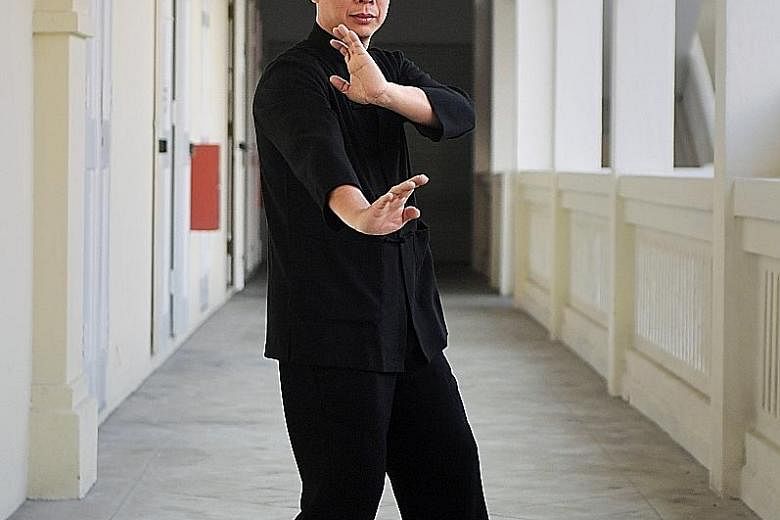8Q
Bald, clean-shaven and clad in a changshan, Mr Dennis Lee bears a striking resemblance to late wing chun martial artist Ip Man.
The 46-year-old wing chun master also happens to be the grand disciple of Ip, having honed his craft under the latter's younger son, grand master Ip Ching.
In November last year, Mr Lee was appointed chairman of the Ving Tsun Athletic Association in Hong Kong - the wing chun association set up by IpMan - making him one of the youngest to be appointed to such a major role in the association.
Wing chun is a martial art that originated from southern China and emphasises strategic movements, especially in close-range combat. Its popularity in Hong Kong is said to have grown because of Ip, who is credited as the first wing chun master to teach the art there publicly.
Mr Lee, who is married with no children, says his goal is to promote wing chun culture, which goes beyond the martial art's technicalities.
"We hope that by teaching people wing chun, they can learn about the culture behind it too, so the passion will not be so easily extinguished, " adds the Hong Konger, who spoke to The Straits Times last month when he was visiting the Singapore branch of his school, the Dennis Lee Ving Tsun Martial Arts Association. It was set up in November last year and has about 30 students.
Mr Lee also runs a moving company with his wife.
Wing chun has enjoyed a second wind in the last decade, thanks to the popular Ip Man movie franchise (2008-2015), says Mr Lee. It caught on in the 1970s, along with the popularity of Bruce Lee flicks. The action star was a disciple of Ip.
But Mr Lee, who has been practising the martial art for more than 26 years, notes that there are also downsides to its popularity.
"There are many others who are making use of the name of wing chun and promoting another form of martial art instead, so it leads others to misunderstand what wing chun is about," he says.
His foray into martial arts started when he took up taekwondo in his youth, but he moved on to wing chun after his uncle introduced him to it. It was only when he met Ip Ching that he started taking the martial art more seriously, he says.
"When I started, I didn't think I would be doing it for so long," he adds.
"It's like studying, you don't just stop once you finish university, you can continue to do so for decades afterwards."
1 What keeps you motivated to practise wing chun?
Wing chun may seem like a simple art, but there are many hidden aspects. Traditional Chinese martial arts contain a lot of ancient wisdom, so this is what led me to want to specialise in wing chun.
There's a culture behind every martial art - it's not just about fighting. For every move, there is a reason behind it and a story of how it came about.
So when we talk about the culture of wing chun, we're not just talking about the movements, but also referring to the thinking behind it. You have to study why you are doing these actions and where they originate from.
2 How has the teaching of martial arts changed over the years?
When I teach students nowadays, I have to explain why we do things a certain way. You have to convince them of it or they won't do it.
In the past, we just did whatever our master told us to without questioning him.
3 What is the biggest challenge facing martial arts today?
A lot of people are slowly losing interest in our traditional ways. Chinese culture is losing out to K-pop and other foreign cultures.
And this is not a problem of just the Chinese. Other countries have their own cultures too, but their citizens also tend to look outwards.
4 When the hype of the Ip Man movies dies down, do you think wing chun will become less popular?
We must understand that the interest will definitely die down a little. It's inevitable, but we have to slow down the decline.
That's why we have to continue creating "noise" for it - through competitions - so people will continue practising.
5 How can people use wing chun in everyday life?
I can't speak for others, but for myself, I do things a lot more simply and directly, according to wing chun principles. In the martial art, we emphasise the principle of "two points, one direct line, without diverting".
When I have a goal in mind, even if there are obstacles in the way, as long as I follow a direct path to my goal, I won't go wrong. You can't find a way around the obstacle, you just have to deal with it.
6 Do martial arts have a place in society in the future?
In all traditional martial arts, there is a cultural background that people can continue to study. As long as they are a part of Chinese culture, martial arts will always be present.
7 What does it take to be a martial artist?
Anyone can be a good martial artist as long as they're willing to learn. We cannot choose who to teach, we have to teach everyone.
Of the 20, 30, 40 or 100 people whom I teach, one of them might just be the future Ip Man.
8 How would you like to be remembered?
I would be happy to be remembered as someone who has contributed to the world of wing chun, even if it's just a bit.


